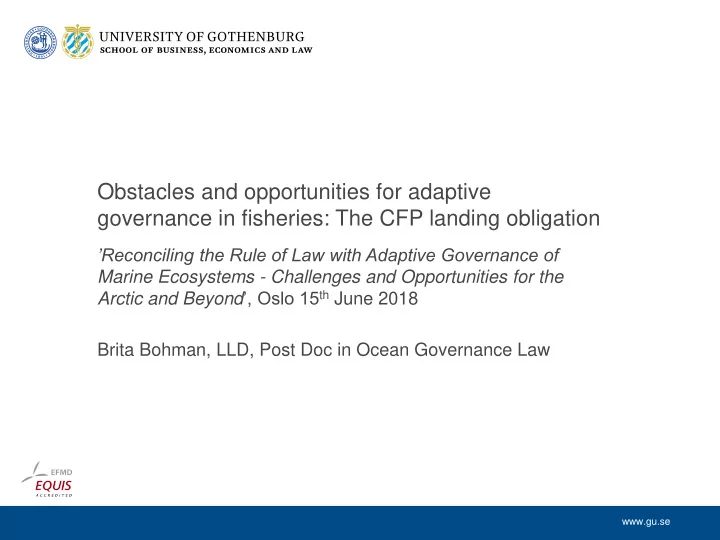

Obstacles and opportunities for adaptive governance in fisheries: The CFP landing obligation ’Reconciling the Rule of Law with Adaptive Governance of Marine Ecosystems - Challenges and Opportunities for the Arctic and Beyond ’, Oslo 15 th June 2018 Brita Bohman, LLD, Post Doc in Ocean Governance Law www.gu.se
The CFP Landing Obligation • The landing obligation (or the discard ban) was introduced with the latest revised version of the CFP, Regulation (EU) No 1380/2013 on the Common Fisheries Policy, Art 15 • The purpose and goal of the landing obligation is to end the practice of discards and hence reduce unwanted catches • It requires that all catches of species which are subject to catch limits shall be brought and retained on board the fishing vessels, recorded, landed and counted against the quotas where applicable (with some exceptions) www.gu.se
Selective fishing methods – > Adaptivity • To comply with/implement the landing obligation the fisheries must use selective fishing gear and other adaptive fishing methods • Create incentives for use of new selective methods/gear • Selective fishing – an adaptive approach • Ecosystem approach in fisheries, the aim for sustainable fishing, is – inter alia – regulation of human activity inputs such as gear, effort, capacity • There is no apparent conflict with rule of law – adaptiveness connected to strict compliance www.gu.se
Enforcement of the CFP landing obligation • Criticized for being difficult to enforce • Difficult to control • Incentives not strong enough for compliance • Economic factors • Large discards anyway • Low level of influence by fisheries and other stakeholders in the implementation • Some quotas difficult to keep to even with selective gear www.gu.se
Enforcement methods • There is no requirements for techniques to be used • EU only requires that the Member States shall aim for a culture of compliance • Suggestions to control fleets be Remote Electronic Monitoring (REM) – but resistance from fisheries • Change of quotas and quota systems • Stakeholder participation – a way to find acceptance and legitimacy among the different actors involved, including fishers www.gu.se
Stakeholder Participation • It is important to increase influence of civil society actors and the participation of resource users • If implementation is to be successful, stakeholder views, knowledge, and cooperation are vital • Increases legitimacy and effectiveness • Stakeholders have better prerequisites for adaptive and selective fishing – Possible selective approaches include: technical measures; minimum mesh sizes, effort regulations, and catch quotas www.gu.se
Participation as a way to enforce adaptivity and flexibility • Stakeholders have had an important role in the CFP, but the formal pathways for their participation have been limited • Giving fishers and other stakeholders more freedom and duties has even been suggested by the Commission • Responsibilities through results-based self-management • Public authorities would set the limits within which the industry must operate • Give industry the authority to develop the best solutions economically and technically www.gu.se
Conclusions Adaptivity in fisheries management seems to be dependent on compliance! But strict rule of law is difficult to apply in regulating fisheries… Incentives for compliance: • Through increased legitimacy • Through managerial compliance • Increase knowledge – Requires some changes in the Regulation Increase adaptivity: • Through strengthening incentives for alternative fishing measures, gear and methods • Through strengthening the possibility for alternative measures (both practically and regulatory) www.gu.se
Thank you! Contact: brita.bohman@gu.se www.gu.se
Recommend
More recommend